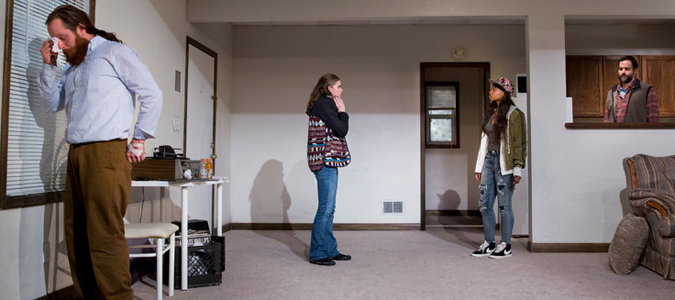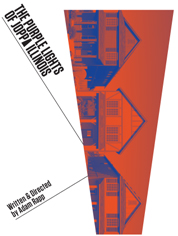

The Purple Lights of Joppa Illinois
Opening Night: June 7, 2016
Closing: June 19, 2016
Theater: Atlantic Stage Two
Ellis Shook lives alone in a small duplex apartment in Paducah, Kentucky. He works nights buffing floors, keeps to himself, and always remembers to take his medication. But when two teenage girls arrive at his doorstep one autumn afternoon, their visit will force him to confront a tragic past while also offering him a glimpse at hope.
BUY TICKETSREAD THE REVIEWS:
June 10, 2016
Crack the scarred, hard surface of an Adam Rapp play, and you’ll discover a yielding marshmallow center. Though this dramatist — the author of the recent “Wolf in the River” and the Pulitzer Prize finalist “Red Light Winter” — creates vicious characters who do unspeakable things to one another, he tends to regard their savagery not with a sneer but a furtive tear. Mr. Rapp’s sentimentality bursts out of the dark, dank closet with his latest effort, “The Purple Lights of Joppa Illinois,” at Atlantic Stage 2. Directed with a tender touch and (for a while anyway) a refreshing respect for silence by Mr. Rapp, this intermission-free, real-time drama portrays a lonely, mentally unstable man trying to reconnect with a world he walked out on. This is a story you have probably encountered many times before if you watch mainstream television drama (particularly the Lifetime channel, where weepiness is next to godliness). But Mr. Rapp redecorates it with his own festive color scheme, which includes lots of blue language, purple prose and lurid accounts of violence, real and imagined. At the story’s center is the fearful and awkward Ellis, played by William Apps, a tallish, bearded man of uncertain age who wears his skin as if it were a badly cut jacket. When the play begins in his dingy, barely furnished home (given authentically depressing life by the set designer Andromache Chalfant), Ellis is evidently expecting company. From his stratospheric anxiety level, you gather that Ellis is also utterly unused to company. Mr. Apps makes a rather sweet display of the symptoms of uneasy anticipation, both usual (he frantically applies deodorant) and less usual (he keeps working a hand grip exerciser he then stuffs in his pants pocket). And then the visitors arrive, a pair that is just as uneasy as their host, though a bit less squirrely in showing it. Their names are Catherine (the startlingly beautiful Katherine Reis) and Monique (a high-octane Susan Heyward). That they are adolescent girls in full hormonal bloom makes you fear for everybody’s safety. The more aggressive Monique is a self-defined feminist and “sociopathic hard-core gangster”; Catherine is as taciturn and nearly as awkward as Ellis. It is she whom he embraces, stiffly and self-consciously, in a genuinely affecting moment of tentative connection. If this were a typical Adam Rapp play, you might expect Ellis and the girls to get down to some serious polymorphous partying. Instead, they wordlessly cohabit the same room while Ellis plays records (vinyl, on a turntable), which include the rapper Tyler the Creator’s “Sandwitches” at ear-blasting volume and a forlorn country and western ballad by Mickey Newbury. These musical, dialogue-free moments, and the stretches of silence that surround them, mark the high points of “Purple Lights.” They establish a vivid sense of characters who are both specifically and idiosyncratically present while maintaining a teasing air of mystery about who exactly they are and how they’ll interact. That tantalizing atmosphere evaporates once these three start to explain themselves. Monique, who is celebrated for her off-the-charts verbal test scores, is obsessed with words and plies them ostentatiously. So, for better or worse, does Mr. Rapp. The revelations that follow are dense with images of dragons, ocelots and creatures called “half-wolves,” as well as homier evocations of everyday family life. This juxtaposition of the exotic and the banal — and the evidence of sad human longings within it — is clearly meant to elicit strong emotions for the audience. Yet the script often feels as inhibitingly self-conscious as Ellis does as a host, suggesting a class writing assignment dutifully carried out by a precocious pupil who would rather be working on something else. Since this is, after all, an Adam Rapp play, there will be blood before the curtain falls. It is spilled not long after the arrival of the play’s fourth character, a strapping and sympathetic nurse played by Connor Barrett. The blood flows, though from the kind of wound that — unusual in the work of this playwright — could easily be handled with a home First Aid kit.
READ THE REVIEW


















